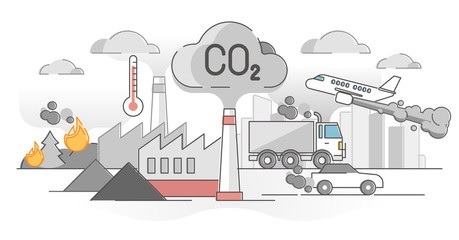
Introduction
In the fight against climate change, solar panels have emerged as a pivotal technology. As a source of renewable energy, solar panels offer a sustainable alternative to fossil fuels, helping to reduce greenhouse gas emissions and mitigate global warming. Understanding how solar panels contribute to these efforts requires an exploration of the differences between the greenhouse effect and global warming, as well as the role of renewable energy in addressing these phenomena.
What Is the Greenhouse Effect?
Definition
The greenhouse effect is a natural process where certain gases in the Earth’s atmosphere trap heat, preventing it from escaping into space. This trapped heat warms the planet, making it habitable.
Key Greenhouse Gases
– Carbon Dioxide (CO₂): Produced by burning fossil fuels, deforestation, and other human activities.
– Methane (CH₄): Emitted during the production and transport of coal, oil, and natural gas, as well as from livestock and other agricultural practices.
– Water Vapor: The most abundant greenhouse gas, but its concentration is largely controlled by natural processes.
– Nitrous Oxide (N₂O): Emitted from agricultural and industrial activities, as well as combustion of fossil fuels and biomass.
Natural Role
The greenhouse effect is essential for life on Earth, maintaining the planet’s temperature at a level that supports ecosystems and human life. Without it, Earth’s average temperature would be about -18°C (0°F), too cold to sustain life as we know it.
Understanding Global Warming
Definition
Global warming refers to the long-term rise in Earth’s average surface temperature due to human activities that increase the concentration of greenhouse gases in the atmosphere.
Primary Causes
– Burning Fossil Fuels: The combustion of coal, oil, and natural gas for energy and transportation releases significant amounts of CO₂.
– Deforestation: Trees absorb CO₂, and their removal leads to higher concentrations of this gas in the atmosphere.
– Industrial Processes: Various industrial activities emit CO₂, CH₄, and other greenhouse gases.
Consequences
– Rising Temperatures: Increased global temperatures lead to more frequent and severe heatwaves.
– Melting Ice Caps: Higher temperatures cause polar ice caps and glaciers to melt, contributing to sea level rise.
– Extreme Weather Events: Changes in climate patterns result in more intense storms, droughts, and floods.
How Solar Panels Help Reduce Global Warming
Reducing Greenhouse Gas Emissions
Solar panels generate electricity by converting sunlight into energy, a process that produces no direct greenhouse gas emissions. By replacing energy generated from fossil fuels with solar power, we can significantly reduce the amount of CO₂ and other greenhouse gases released into the atmosphere.
Energy Independence
Solar panels provide a sustainable and independent source of energy. By harnessing the power of the sun, countries can reduce their reliance on fossil fuels, which are often imported and contribute to geopolitical instability.
Decreasing Carbon Footprint
Adopting solar energy on a large scale can lead to a substantial decrease in the carbon footprint of households, businesses, and entire nations. This reduction is critical for meeting international climate goals and limiting global warming.
Economic Benefits
The installation of solar panels creates jobs in manufacturing, installation, and maintenance. It also reduces energy costs over time, providing economic relief to consumers and contributing to a more sustainable economy.
Effects on the Greenhouse Effect
Stabilizing Greenhouse Gas Concentrations
By reducing the reliance on fossil fuels, solar panels help stabilize the concentration of greenhouse gases in the atmosphere. This stabilization is crucial for maintaining the natural greenhouse effect without exacerbating global warming.
Mitigating Climate Change
The adoption of solar energy contributes to broader efforts to mitigate climate change. By reducing greenhouse gas emissions, we can slow the rate of global warming and its associated impacts on the environment and human societies.
Difference Between Greenhouse Effect and Global Warming
Greenhouse Effect
– Nature: A natural process essential for life on Earth.
– Cause: Caused by the presence of greenhouse gases like CO₂, CH₄, water vapor, and N₂O in the atmosphere.
– Function: Traps heat in the atmosphere, maintaining Earth’s temperature at a life-supporting level.
Global Warming
– Nature: A human-induced phenomenon resulting from increased concentrations of greenhouse gases.
– Cause: Primarily caused by activities such as burning fossil fuels, deforestation, and industrial processes.
– Function: Leads to a rise in Earth’s average surface temperature, causing climate change and extreme weather events.
Conclusion
The installation of solar panels plays a crucial role in reducing global warming by providing a clean and sustainable source of energy. By decreasing our reliance on fossil fuels, we can lower greenhouse gas emissions, stabilize the natural greenhouse effect, and mitigate the impacts of climate change. Understanding the difference between the greenhouse effect and global warming is essential for recognizing the importance of renewable energy solutions like solar power in addressing the climate crisis.
FAQs
How do solar panels generate electricity?
Solar panels convert sunlight into electricity using photovoltaic cells. These cells absorb photons from sunlight, creating an electric current that can be used to power homes and businesses.
What are the environmental benefits of solar panels?
Solar panels produce clean energy, reducing greenhouse gas emissions and air pollution. They also decrease dependence on fossil fuels and help conserve natural resources.
How does solar energy contribute to economic growth?
The solar industry creates jobs in manufacturing, installation, and maintenance. It also reduces energy costs for consumers, providing economic relief and promoting a sustainable economy.
Can solar panels completely replace fossil fuels?
While solar panels can significantly reduce reliance on fossil fuels, a combination of renewable energy sources, including wind, hydro, and geothermal, is needed to completely transition away from fossil fuels.
What are the challenges of solar energy adoption?
Challenges include the initial cost of installation, the need for efficient energy storage solutions, and the availability of sunlight in different regions. However, technological advancements and supportive policies can help overcome these barriers.
